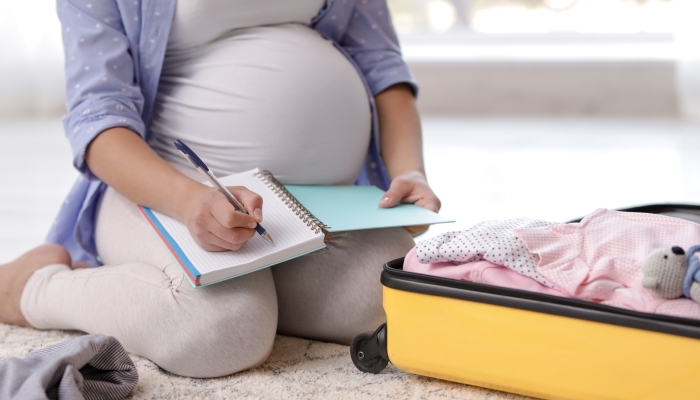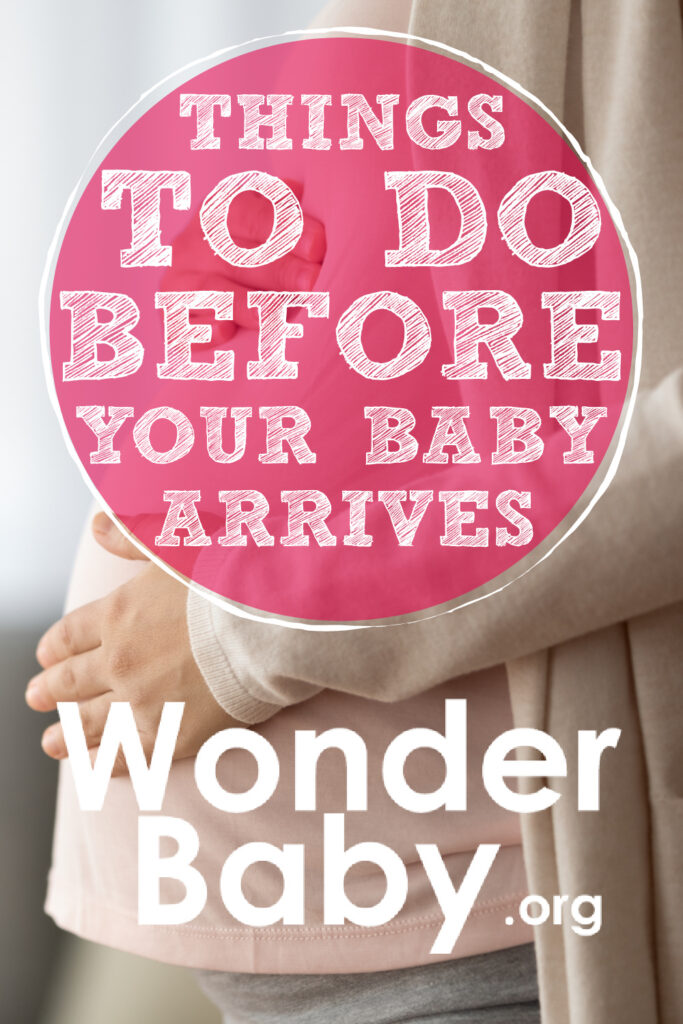7 Things to Do Before Your Baby Arrives

- Advanced preparation is key before your baby arrives and should begin as soon as practically possible.
- Baby care skills are helpful to learn before your newborn’s arrival but are not required.
- There are many physical and mental preparations to make as you get ready for your baby.
The third trimester of pregnancy is a busy time. While your body is putting the finishing touches on your new baby, you and your family are likely making preparations to welcome them.
Especially if this pregnancy is your first, it can be hard to know what you need to have ready during the last few weeks before your due date and the entrance of your little one.
There seems to be so much to do and so little time to prepare for giving birth and the newborn phase. Like many parents, you may be wondering, “What are the priority things to do before my baby arrives?”
Taking care of some of these essential things before your baby arrives will save you and your partner from unnecessary stress during and after delivery, so you can enjoy that precious time with your newborn.
Preparing For Your Baby’s Arrival
When it comes to pregnancy and childbirth, many veteran parents will say to expect the unexpected. There’s an element of truth to this saying.
While a woman’s due date is considered the endpoint of pregnancy, for many mothers, the circumstances, timing, and method of delivery can all be fluid variables.
Because it isn’t known exactly when your sweet baby will arrive, advanced preparation is key.

When Should You Start to Prepare for Your Baby’s Arrival?
For many expectant parents, preparations begin as soon as they see a positive pregnancy test result. Others may choose to wait until later in the pregnancy.
If this new child is your first baby, preparations should begin as soon as practically possible.
Starting early can allow you to save money, stock up on baby items and household essentials (like toilet paper), consider a new vehicle to make room for more car seats, or make changes to your home to accommodate the newest family member.
4 Things to Learn for Your Newborn’s Arrival
If you haven’t spent much time around a new baby, their behavior may surprise you.
Fortunately, there are some ways to know what’s normal in the newborn period before your baby arrives.
| Normal Newborn Findings | |
| Feeding patterns | Every 2–3 hours around the clock |
| Wet and dirty diapers | Wet diapers: At least 6 per dayDirty diapers: 3–4 per day |
| Sleep patterns | 16–17 hours per 24-hour period |
| Crying | Normal; baby’s way to express what they want |
You don’t have to have perfect caretaking skills before your baby enters the world, although some knowledge is helpful.
Your delivery nurse at the hospital will help you learn how to feed, diaper, and soothe your baby.
Take a Class
If you’re breastfeeding, consider attending a breastfeeding class or ask to speak with a lactation consultant while you’re in the hospital.
Their knowledge and skill can make a big difference in the early days of breastfeeding.

7 Things to Do Before Baby Arrives
If at all possible, make as many preparations as you can before your due date approaches.
Since the first few weeks after delivery are unpredictable, it can make life easier to know that you and your partner are physically and mentally prepared to receive your new baby.
Consider doing the following as your pregnancy progresses:
Create a Baby Registry
Excited family members and friends will likely want to give gifts to welcome your baby.
Consider creating an online gift registry for your baby. This is particularly helpful for well-wishers who live out of state—many items can be shipped directly to your house.
Items like baby clothes and blankets tend to be popular gifts, but you’ll need some more practical things, too.
As you prepare your registry, consider adding the following items:
- Infant or child first aid kit
- Burp cloths
- Breast pump and breast pump parts (if you plan to breastfeed or pump milk for your baby)
- Pacifiers (if you plan to use them)
- Bottles and nipples for expressed breast milk or formula
- Diaper bag
- Newborn care items (baby wash, lotion)
- Mild, non-irritating laundry detergent
- Car seat
- Baby gear, like strollers or infant carriers
Gathering these items over time may help decrease financial strain, instead of buying them all at once shortly before delivery.
Contact Your Insurance Company
While this topic may seem boring, it’s actually very important.
Some health insurance companies have policies regarding the birth of your newest family member and require advanced notification of their arrival.
Other times, insurance companies will allow you to call within a few days of delivery and add your new baby to the existing plan.
Contacting your individual health insurance provider well ahead of your due date to learn about their specific policies can save a lot of stress after the birth of your baby.
Talk With Your Partner
The last trimester is an excellent time to talk with your partner about the impending birth of your little one.
Most people haven’t been involved in pregnancy or childbirth except for the birth of their own children, and many form their opinions through popular culture and TV shows. While entertaining, these sources aren’t always reliable or accurate.
Talk to your partner about such things as:
- Do you want to cut the umbilical cord?
- What scares you about delivery?
- What’s important to you while we’re at the hospital?
- Are there any beliefs or traditions in your family involving childbirth that are important to you?
- Who should visit us while we’re in the hospital? (Some parents enjoy a full house and others want it to be a private party.)
- Arrangements for who will care for older children and pets.
Knowing your partner’s views on these issues prior to delivery will help you both feel more relaxed when your baby is born.
Talk With Your Doctor
You’ll be seeing a lot of your doctor during those last weeks of pregnancy, so there will be many opportunities to ask questions.
Make the most of these visits by bringing a list of topics to discuss regarding the labor and delivery process, particularly if you and your partner decide to create a birth plan.
Consider asking about:
- What methods can be used at home to help induce labor
- When to come to the hospital
- What methods can be used to help labor progress
- Options for pain relief (epidural, nitrous oxide, IV pain medication)
- Indications for a Cesarean delivery, including your preferences
- Things to bring in your hospital bag
- How long you can expect to stay in the hospital after a vaginal or Cesarean delivery
- The process of submitting paperwork for maternity leave
The labor and delivery process is unfamiliar to many people.
By asking questions of your provider, you and your partner will be informed and able to participate more fully in the decision-making process.
Pre-Register
Choosing a doctor for your newborn is an important task during the last weeks of pregnancy.
Your delivery hospital will need to know where to send records of your baby’s birth.
You will need to feel comfortable with the provider you choose for your newborn and may wish to interview the prospective doctor, particularly if you’re changing offices.
After all, you’re going to be spending a lot of time together as your baby grows, so it’s important to have a good working relationship with whomever you choose.
Extras
There are many, nonessential, experiences you might enjoy during the last weeks before you deliver.
If time and your budget allow, consider these great ideas:
- Prenatal massage. With your doctor’s approval, prenatal massage can be a great way to relieve the aches and pains commonly experienced in the last trimester.
- Maternity photos. Maternity photo shoots are very popular. They don’t have to be expensive to be meaningful!
- Birth announcements. It can be so helpful to have your birth announcement designed ahead of time, then simply fill in the details after your baby’s birth. Your pregnancy brain will thank you!
- Freezer meals. Prep and freeze several easy-to-make meals for enjoyment after your baby is born.
- Date Night. Setting aside an evening or weekend shortly before the birth of your baby can provide valuable alone time for adults to rest and recharge their relationship.
Rest
Finally, take the time for extra rest and savor these last days as you anticipate the birth of your baby.
Pregnancy is a special time, and you’re much more likely to enjoy it and the necessary preparations if you’re not sleep-deprived.

What Are The Things to Avoid Doing Before Your Baby’s Arrival?
While most pregnant women have few restrictions in their final trimester, there are some practices to avoid in order to reduce risk to you and your baby.
Pre-Term Methods to Induce Labor
Most expectant mothers will tell you that the third trimester is, in a word, uncomfortable.
Basic activities like walking, sleeping, and using the bathroom all become more challenging as your little one grows in size.
However uncomfortable and unpleasant these limitations may be, it’s extremely important to avoid methods to induce labor unless your doctor has given you permission to try them.
Preterm delivery carries its own risks for your baby, and unless medically required, isn’t necessarily best for you either.
Long Distance Travel
Most physicians agree that expectant mothers should not travel far from home in the weeks leading up to the birth of their baby.
Long-distance travel can predispose pregnant women to serious complications, such as blood clots.
Additionally, many airlines have restrictions regarding pregnant women and air travel.
If you absolutely must travel in the later stages of your pregnancy, be sure to follow your doctor’s advice for the safety of you and your little one.
Unapproved Medication Use
In an effort to relieve the discomforts of later pregnancy, many women seek relief from products marketed to ease their aches and pains.
All remedies, to some extent, pose a risk to your little one before delivery—and sometimes after birth, too.
Be sure to seek your doctor’s advice before starting a new medication, supplement, or product.
Further, it’s wise to verify that any current use of these remedies also has your doctor’s approval.
The weeks approaching your due date are filled with items to organize and decisions to make. By beginning preparations to welcome your little one as far in advance as practically possible, you’ll be well-positioned to rest and enjoy the remainder of your pregnancy.

The information WonderBaby provides is not intended to be, and does not constitute, medical or other health advice or diagnosis and should not be used as such. Always consult with a qualified medical professional about your specific circumstances.
Related Posts

Pregnancy
How To Deal With an Ingrown Hair on a C-Section Scar
Ingrown hairs on a C-section scar can be treated using a warm compress or mild exfoliation. Infected ingrown hairs may require antibiotic treatment.

Pregnancy
What’s a Dye Stealer Pregnancy Test?
A dye stealer pregnancy test usually means that your hCG levels are very high, which is typically considered a good sign for pregnancy.

Pregnancy
Can Yelling Cause a Miscarriage?
Yelling alone can not cause a miscarriage. However, maternal stress can cause high blood pressure, preterm labor, and other health problems.